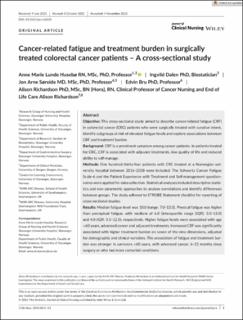| dc.contributor.author | Husebø, Anne Marie Lunde | |
| dc.contributor.author | Dalen, Ingvild | |
| dc.contributor.author | Søreide, Jon Arne | |
| dc.contributor.author | Bru, Edvin | |
| dc.contributor.author | Richardson, Alison | |
| dc.date.accessioned | 2021-12-09T09:18:55Z | |
| dc.date.available | 2021-12-09T09:18:55Z | |
| dc.date.created | 2021-12-02T14:46:47Z | |
| dc.date.issued | 2021 | |
| dc.identifier.issn | 0962-1067 | |
| dc.identifier.uri | https://hdl.handle.net/11250/2833524 | |
| dc.description.abstract | Objective
This cross-sectional study aimed to describe cancer-related fatigue (CRF) in colorectal cancer (CRC) patients who were surgically treated with curative intent, identify subgroups at risk of elevated fatigue levels and explore associations between CRF and treatment burden.
Background
CRF is a prominent symptom among cancer patients. In patients treated for CRC, CRF is associated with adjuvant treatments, low quality of life and reduced ability to self-manage.
Methods
One hundred thirty-four patients with CRC treated at a Norwegian university hospital between 2016–2018 were included. The Schwartz Cancer Fatigue Scale-6 and the Patient Experience with Treatment and Self-management questionnaires were applied for data collection. Statistical analyses included descriptive statistics and non-parametric approaches to analyse correlations and identify differences between groups. The study adhered to STROBE Statement checklist for reporting of cross-sectional studies.
Results
Median fatigue level was 10.0 (range: 7.0–13.0). Physical fatigue was higher than perceptual fatigue, with medians of 6.0 (interquartile range [IQR]: 3.0–13.0) and 4.0 (IQR: 3.0–12.0), respectively. Higher fatigue levels were associated with age <60 years, advanced cancer and adjuvant treatments. Increased CRF was significantly associated with higher treatment burden on seven of the nine dimensions, adjusted for demographic and clinical variables. The association of fatigue and treatment burden was stronger in survivors <60 years, with advanced cancer, 6–12 months since surgery or who had more comorbid conditions.
Conclusions
This study showed patients at risk of experiencing CRF following CRC treatment. It established proof of associations between CRF and treatment burden and identified subgroups of CRC patients where this association was stronger.
Relevance to clinical practice
Screening of CRF in CRC patients can help clinicians provide individualized treatment and care to manage CRF. Clinicians should consider the association between CRF and treatment burden, especially in subgroups of CRF patients. | en_US |
| dc.language.iso | eng | en_US |
| dc.publisher | Wiley | en_US |
| dc.rights | Attribution-NonCommercial-NoDerivatives 4.0 Internasjonal | * |
| dc.rights.uri | http://creativecommons.org/licenses/by-nc-nd/4.0/deed.no | * |
| dc.title | Cancer-related fatigue and treatment burden in surgically treated colorectal cancer patients – A cross-sectional study | en_US |
| dc.type | Journal article | en_US |
| dc.type | Peer reviewed | en_US |
| dc.description.version | publishedVersion | en_US |
| dc.rights.holder | Copyright 2021 The Authors | en_US |
| cristin.ispublished | true | |
| cristin.fulltext | original | |
| cristin.qualitycode | 2 | |
| dc.identifier.doi | 10.1111/jocn.16135 | |
| dc.identifier.cristin | 1963543 | |
| dc.source.journal | Journal of Clinical Nursing (JCN) | en_US |
| dc.identifier.citation | Journal of Clinical Nursing, 2021. | en_US |

